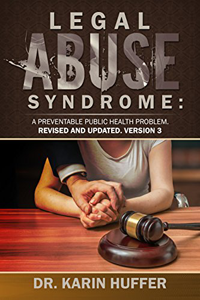 Book review — Legal Abuse Syndrome: A Preventable Public Health Problem, by Dr. Karin Huffer
Book review — Legal Abuse Syndrome: A Preventable Public Health Problem, by Dr. Karin Huffer
Review by Donna Andersen
You’re traumatized by your experience with a sociopath. Then you face a divorce, child custody or some other court battle against the sociopath — and you’re traumatized all over again.
The sociopath lies about you, smears your reputation and makes false accusations against you. So do his or her attorneys. And the clueless judge allows all of it.
Thirty years ago, Dr. Karin Huffer, a marriage and family therapist, witnessed this phenomenon among her clients. No matter what she did to help them, they kept getting worse. Then she realized that everything she did for them was being undone when they went to court.
Her clients were up against sociopaths (antisocials, narcissists, borderlines, histrionics, psychopaths). Dr. Huffer calls these people, “power-centered individuals.” The sociopaths were not in court for equitable distribution or to protect the interests of the children. They were there to grind her clients into the dirt — and the legal system often assisted in the destruction.
Legal Abuse Syndrome
Dr. Huffer called the phenomenon “legal abuse syndrome.” It’s a form of post-traumatic stress disorder, a psychiatric injury caused when legal authorities fail to uphold their responsibilities to provide a fair venue for justice.
Her book teaches you how to overcome legal abuse syndrome in eight steps. These eight steps are also good for helping you overcome the injury inflicted by a sociopath, even if you aren’t in court against the person. They are:
- Debriefing
- Grieving
- Obsession
- Blaming
- Deshaming
- Reframing
- Empowerment
- Recovery
The idea is to recognize when you are being assaulted and respond immediately. In fact, Dr. Huffer says you can minimize the possibility of a psychological assault turning into full-blown legal abuse syndrome by preparing for and processing each assault as it is delivered.
Debriefing
The first of Huffer’s eight steps is debriefing, which means telling someone exactly what happened and how you feel about it. In fact, Dr. Huffer has created a debriefing worksheet — a paper with a series of concentric circles where you can record the experience. At the center, you describe the incident. In the ring around it, you describe the impact of the incident. Around that, you describe your feelings about the incident. Finally, in the outside ring, you record the losses you suffered because of the incident.
It’s very important to be heard — that’s why Dr. Huffer recommends completing the debriefing worksheet with another person. Sometimes, however, it’s difficult to find someone who can listen to you appropriately — you may have noticed the eyes of your friends and family members glazing over as you try to explain what you endured. One reason is that everyone has protective filters. When your story impacts the sense of safety of others, they may feel threatened and start to tune out of the conversation. Even some therapists don’t understand the depth of the injury and the best way to help you.
So Dr. Huffer offers advice for listeners:
We must be willing to accept anything the offended relates. Acceptance doesn’t mean that we approve, only accept. Listening and caring provides a moment of clarification and expression for the victim. The offended needs his or her full range of traumatic experience to be heard in an accepting environment …
Advocates and listeners need to refrain from fixing, suggesting, or trying to solve at this stage. The listeners must be willing to validate the injured person’s experience of injury, allow compassionate and caring responses, and help the injured put the events in order.
Obsession
Many Lovefraud readers realize that they are obsessing about the sociopath, and don’t understand why they can’t get over what happened. If this is you, please be reassured: Obsession is a normal stage of dealing with the psychological injury inflicted by the sociopath.
Dr. Huffer actually lists 16 different styles of obsession — this alone should be reassuring, because one of them probably describes you. Then Dr. Huffer explains what to do about obsession:
- Name it
- Face it
- Own it
- Accept it
- Manage it
The prime tool for managing obsession is compartmentalizing it. You do this by setting aside time when you will allow yourself to dwell on the issue, and not allowing yourself to dwell on it outside of the designated time period. Essentially, you schedule yourself out of the obsession.
Blaming
Dr. Huffer’s chapter on blaming is fascinating, because she describes blaming the perpetrator as not only therapeutic for the victim, but important for society. Why? Because the perp violates society’s moral code.
Here’s how she summarizes the guidelines of our moral code:
- I may not violate your right to live and enjoy what you have earned.
- You may wish to live in a climate of freedom, to think and function as you wish.
- Your actions will not violate my right to live and enjoy what is mine and to think and function according to my conscience.
- If a violation occurs, then I have the right to confront you and inform you that you have violated the moral contract.
When someone does violate the moral code, Dr. Huffer says blaming actions need to be considered carefully. Sometimes it’s difficult to figure out exactly who to blame, for example, in cases of corporate neglect or malfeasance that led to personal injury. The objective, she says, “is to find who made the decision to violate the moral contract with full knowledge that the act would cause suffering.”
A blaming action is effective, Dr. Huffer says, when it brings satisfaction to the victim.
Third edition
Legal Abuse Syndrome was originally published in 1995, and the third edition was updated and published last year. Dr. Huffer wanted to make it accessible, so she intentionally set the pric low — it costs only $5.99 on Amazon.com.
If you’ve been traumatized by your experience with a sociopath, and especially if you’re fighting the sociopath in court, read this book. It offers a wealth of understanding about why power-centered individuals do what they do, and why you, if you’ve been deceived, betrayed and injured, feel the way you feel.
More importantly, Legal Abuse Syndrome offers practical strategies that you can use to overcome feelings of despair and take back your power.





































regretfullymine
mine NEVER showed up for ANY court hearings, not once. the day our divorce became final, he was in the courthouse, but NOT in the courtroom, with his lawyer, mine, me or the judge. “too emotionally distraught”, his lawyer said. I saw him briefly, afterwards, when ‘in good faith’ he wrote a check, for a portion of the settlement. I think he did this, to make a good impression. The local county attorney had had him under a financial guardianship, until the divorce was final. I’m sure THAT caused a major tantrum (or several). All grist for his mental mill, to brainwash and poisen our 3 sons against me. Psychopaths are WEIRD in legal settings, is all I can say.